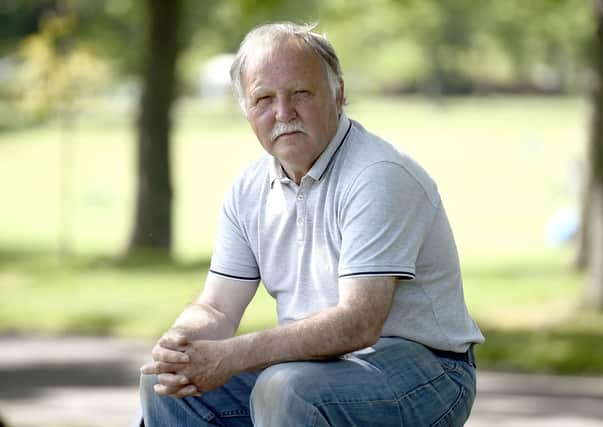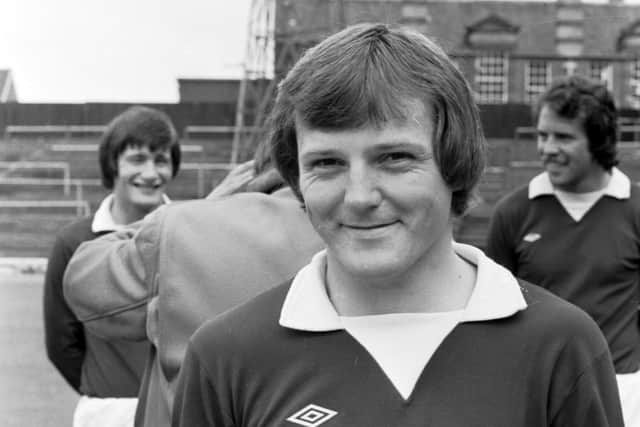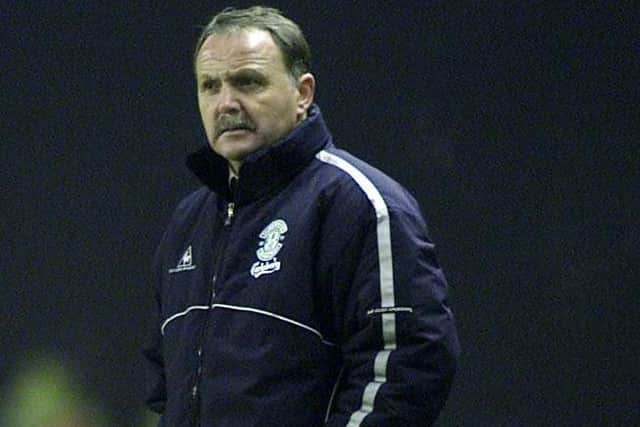Interview: Donald Park on run-ins with Romanov and Rod Petrie, taming Derek Riordan and Garry O’Connor and Hearts’ first relegation


The blazing sunshine beating down on this expanse of green offers a chink of light to the humble scribe eager to meet a football man face-to-face again after the Covid-enforced crackdown on such pleasures. I was once chased by the parkie here, for trying to skip on to the pitch-and-putt course without paying, but now I’m sat at the required distance on a bench listening to the yarns of Parkie.
Donald Park in Edinburgh’s Inverleith Park places the man roughly halfway between Tynecastle and Easter Road, the two grounds with which he is most associated. Career highs and lows include a fine reputation as a finesser of young talent at Hibernian and, as a player himself, the notoriety of being a member of the very first Hearts team to be relegated from the top flight. Sacked twice as a coach in Leith and once in Gorgie following brushes with Rod Petrie and Vladimir Romanov, he has always managed to bounce back. “I’ve developed a wee technique for that,” he smiles. “When you leave, don’t bang the door too hard behind you!”
Advertisement
Hide AdAdvertisement
Hide AdNever mind the two-metre rule, the very business of interviews is a strange one for Park. “I normally don’t do press. This is a good face for radio.” Beneath the thicket of hair and a moustache still flourishing at 66, he was a wee Highland terrier initially on the wing and then the midfield. For his tenacity he always turns up in Jambos’ lists of the underrated and unsung. He was unwanted in 1978, went to Partick Thistle, was determined to prove Hearts wrong and helped demote them for a second time. Relegation is topical at Tynie so let’s begin with the first, 43 years ago.


I read out a typical line-up from that season: Jim Cruickshank, Jim Brown, Roy Kay, Graham Shaw, John Gallacher, Dave Clunie, Kenny Aird, Drew Busby, Willie Gibson, Parkie, Bobby Prentice. It doesn’t look too shabby on paper, so what went wrong?
“I don’t remember a defining moment which told us we were doomed. There was no animosity, no unrest in the dressing room or unhappiness with the manager. It was just… a disaster. When we knew we were down there wasn’t any anger, just embarrassment.”
Football over shinty
Park fronts up and takes some personal responsibility. “I think I stopped doing the things I could do well. And if a team drops 5 per cent, don’t track back quick enough, for instance, then silly goals get lost. It’s amazing the difference that 5 per cent can make. The effects can be astronomical.


“The fans were grumpy that season but they’d every right to be. I remember one guy giving me pelters from the halfway line most of the game then at the end marching round the terracing all the way to the tunnel – you could do that before segregation – and jabbing his finger at me all the way. You couldn’t accuse him of not tracking back!
“Look at that team: it wasn’t bad. Willie Gibson was phenomenal. Never hit the ball cleanly, always found the corner. And Drew Busby was hard as nails but honest, a gem of a man. Me, I was never great but I had a decent attitude. Our manager John Hagart was a lovely guy though just too nice. The harshest he got was to say: ‘You’re doing great, absolutely fantastic – but you’re no’ playing the day’!”
Park hails from the village of Caol, the son of a British Aluminium worker in nearby Fort William. A pimple of a place before the opening of a paper mill, Caol deserves a Queen’s Award for Industry for the professional footballers it has turned out: “The first was Donnie Gillies who scored a famous goal for Bristol City at Elland Road to knock Leeds out of the FA Cup. Then there was John McGinlay and Duncan Shearer who became Scotland internationalists and George Campbell who played for Aberdeen. Duncan’s actually my second cousin, a result of all the inbreeding in the Highlands!”
So how come they all managed to avoid shinty? And were that sport’s office bearers weeping at the village gates when they left? “I loved shinty and played it in the summer but loved football more. At the bottom of our road there was a concrete bus shelter a bit like a pill-box and I used to spend hours trying to hit a ball through the hole.” Quite a contrast with the 4G pitches and training domes Park would inhabit as an under-age coach with Scotland, another rewarding stint for our man.
Advertisement
Hide AdAdvertisement
Hide Ad“As a youngster I was always trying to better myself as a player,” he continues. “I made an important decision not to go with drink. Coming from the Highlands that could have blown me off course. I didn’t touch it until I was 22 and then I’d be drunk on two shandies.”
‘You won’t get another game here’
Park arrived at Tynecastle in 1972 having been signed from the old Inverness Caledonian by Bobby Seith. He doesn’t have a bad word to say about any of his bosses, despite suffering the odd bump and bruise along the way. “I’m still shy but was much more so back then and would just sit in the corner of the dressing room, dead quiet.
“My sister Sylvia had a flat off Gorgie Road and I stayed with her. I actually came down to Edinburgh thinking I could combine football with studying maths and chemistry at Heriot-Watt University but my chance in the first team came quickly and I had to put the books away. I wondered about becoming a schoolteacher after football but that wouldn’t have worked: I’m far too crabbit!”
Park scored on his debut in a win against Arbroath but a few weeks later would come a scoreline to make him shudder: Hearts 0, Hibs 7. “It haunts me,” he groans. “Folk still say: ‘You played in the seven-nil game, didn’t you?’ It was my first Edinburgh derby but I’m not sure I did. I missed a chance when it was nil-nil – the ball came on to my left foot and I can still see it go by the post – but after that I didn’t get another touch.
“Hibs had a brilliant team back then. Alex Edwards was fantastic and so was Crops [Alex Cropley] and [John] Blackley, all of them really silky, while Shades [Erich Schaedler] would just batter you. Maybe this was the naive teuchter in me but if I didn’t have a game I’d go to Easter Road and watch that team. Paid to get in as well.” It sounds more like the football student in him, actually, and the future coach.
Mention of Edwards reminds me of a funny tale I was told by the latter about him landing a sales job with a brewery also fancied by three ex-Hearts players, which enabled him to boast: “I was still beating Jam Tarts even after hanging up the boots.” Park laughs and offers his version: “Typical Mickey, he’s embellished the story. He was the rep in Fife for Ind Coope when the position in Edinburgh became vacant. He moved into it and I took over his job. Great player, wee chancer. We had good laughs working together along with [ex-Kilmarnock] Jim McSherry.”
Though there would be a thrilling Euro win over Lokomotiv Leipzig for Park’s Hearts and a Scottish Cup final, the trapdoor would swallow them in 1976-77. He helped the team come straight back up but was soon being summoned to the manager’s office, by then occupied by Willie Ormond: “He told me Bertie Auld at Thistle wanted to speak to me. They were part-time and I told Willie I wasn’t sure that was for me. He said: ‘Oh I want you to go, son, you need to go. You won’t get another game here.’” Guess who the opposition were for Park’s Jags debut? “I was never more wound up than for that game against Hearts. I wanted to show them they were wrong for letting me leave. That was when I sort of stumbled across psychology. The night before the game I went for a walk and tried to visualise how it might go, thinking about the opposition’s qualities and their bad points. We won and every other game I played after that I did the same thing. I didn’t really appreciate the work of a psychologist until I was at Hibs and they recruited one.”
The bold Bertie’s approach may have been less scientific but it was effective. “He was great for me,” says Park, “but really an absolute nightmare. He slaughtered us at training. There was this routine, ten stations, running between them, which we called ‘The Coffin’ and if anyone cut a corner everyone had to go right back to the start. I can picture the boss one Saturday morning before a game – we trained then, too – and losing it with Bobby Houston who wasn’t hitting Andy Anderson at the near post so Bertie rolled his suit trousers into his socks and showed him how it was done. But he never got us relegated. We had a good team, guys like Doug Somner and Jim Melrose, while Roughie [Alan Rough] was worth ten points a season. I played better at Thistle than I ever did for Hearts.”
Advertisement
Hide AdAdvertisement
Hide AdThe football student still being a maths student, he filled his free time by becoming a tax officer. In that initial season at Firhill, he followed up the victory over his old team with three more. That would lead, along with taxes, to another certainty in life for Hearts: relegation. In the win at Tynecastle more or less confirming it, Park netted the crucial goal from almost on the line – just like Denis Law had done for Manchester City, sending Man U down. “I was sad for the boys I used to play alongside but my motivation was: ‘They should never have sold me.’ ”
They quickly brought him back and while he never won a capital derby in his first spell – apart from in the East of Scotland Shield, a baking hot day, his equaliser forcing extra time and prompting Alex Edwards to inquire: “What the f*** did you do that for?” – Park didn’t lose any, second time around, as Alex MacDonald was assembling his relentless side. “After all these defeats, that was enjoyable. Hearts when I rejoined were more professional and much fitter.”
Park bought the West End Hotel in the capital – “A teuchters’ retreat” – and thought he could combine the business with playing for Brechin City. “That was stupid; I didn’t realise Brechin was so far away!” He wound down his career with Meadowbank Thistle, returned a few years later to manage them but realised this wasn’t the role for him. “I like having a relationship with players but for managers that’s difficult. I decided I would coach, try to keep my head below the parapet to avoid it being blown off, although that still happened.”
Sometimes when it did Park would drift back up to the Highlands, usually to team up with John Robertson. He talks about “coincidences” and how they’ve happened to his advantage – Sliding Doors moments, if you like – but being good at what he does comes into it, too.
Being sacked by Rod Petrie (twice)
Let the records show that he is undefeated as a Hibs boss, his sole game in charge as caretaker following the departure of Alex McLeish being a draw at Ibrox. He went on to be No 2 to Franck Sauzee – “I felt so sorry for him” – and was then dismissed with the Frenchman. “Before that, the first time Rod Petrie was going to sack me, I’d told him to do it quick so I could get on with the rest of my life. From then on we had a good relationship – even though he’d sack me again!”
Until just recently he was coaching at Hearts before requesting to step down to help look after his two-year-old grandson with his wife Margaret while the boy’s father, currently back in his native Fiji, attempts to return here. Previously at Tynecastle he assisted Robertson until Vladimir Romanov embarked on his tinpot tyranny. A “disaster” is how Park sums up that era, choosing the moment when the regime ordered the players to kill the celebratory dressing-room music following a Euro win at FC Basel to sum up its madness.
Before that, at Easter Road Park helped operate the assembly line which turned out effervescent youngsters bound for big moves and international caps. “That started with Alex Miller and myself going down to Musselburgh to sign Kenny Miller. Later came Derek [Riordan], Garry [O’Connor], Kevin [Thomson], Steven [Whittaker] and Scotty [Brown].
“They were all different but all great kids. Derek and Garry were more of a challenge for always wanting a laugh. With them I realised the part environment can play in a young player’s development. [Fellow coach] Ian Westwater would go: ‘Derek’s just looked me in the eye and told a giant porky’. I’d say: ‘He comes from Granton, you’ve got to do that there. He’s not Corstorphine or Currie like you.’
Advertisement
Hide AdAdvertisement
Hide Ad“That pair should have achieved much more in their careers. Garry’s a decent guy, just daft. He got carried away with his success. He went to Russia, made a load of money and then frittered it away. Did football let him down by not advising him properly? I don’t know. Derek’s mistake was staying in Edinburgh; he had to leave his friends behind. He was the most gifted young player I’ve ever seen.
“I used to wander the public parks and first noticed him as a 12-year-old, scoring hundreds for his juvenile team. He was two-footed but it was the right I was worried about later when I was at Hearts and I remember before a derby telling Robbie Neilson to show him down the other side. What did Derek do? Scored a beauty with his left. It went in like a laser. Unlike many I think he did well at Celtic. Gordon [Strachan] seemed to make up his mind that he just didn’t fancy the boy. Every time Derek came on during a game, though, he seemed to score. Sometimes I think managers just want to be proved right.”
Doesn’t everyone in football? What he would term the tenacity of a teuchter has enabled Park to survive the occasional stumble. Family is coming first for him right now but who knows, there could yet be another Sliding Doors moment. None will be slammed, that’s for sure.
A message from the Editor:
Thank you for reading this story on our website. While I have your attention, I also have an important request to make of you.
With the coronavirus lockdown having a major impact on many of our advertisers - and consequently the revenue we receive - we are more reliant than ever on you taking out a digital subscription.
Subscribe to scotsman.com and enjoy unlimited access to Scottish news and information online and on our app. With a digital subscription, you can read more than 5 articles, see fewer ads, enjoy faster load times, and get access to exclusive newsletters and content. Visit https://www.scotsman.com/subscriptions now to sign up.
Our journalism costs money and we rely on advertising, print and digital revenues to help to support them. By supporting us, we are able to support you in providing trusted, fact-checked content for this website.
Joy Yates
Editorial Director
Comments
Want to join the conversation? Please or to comment on this article.
